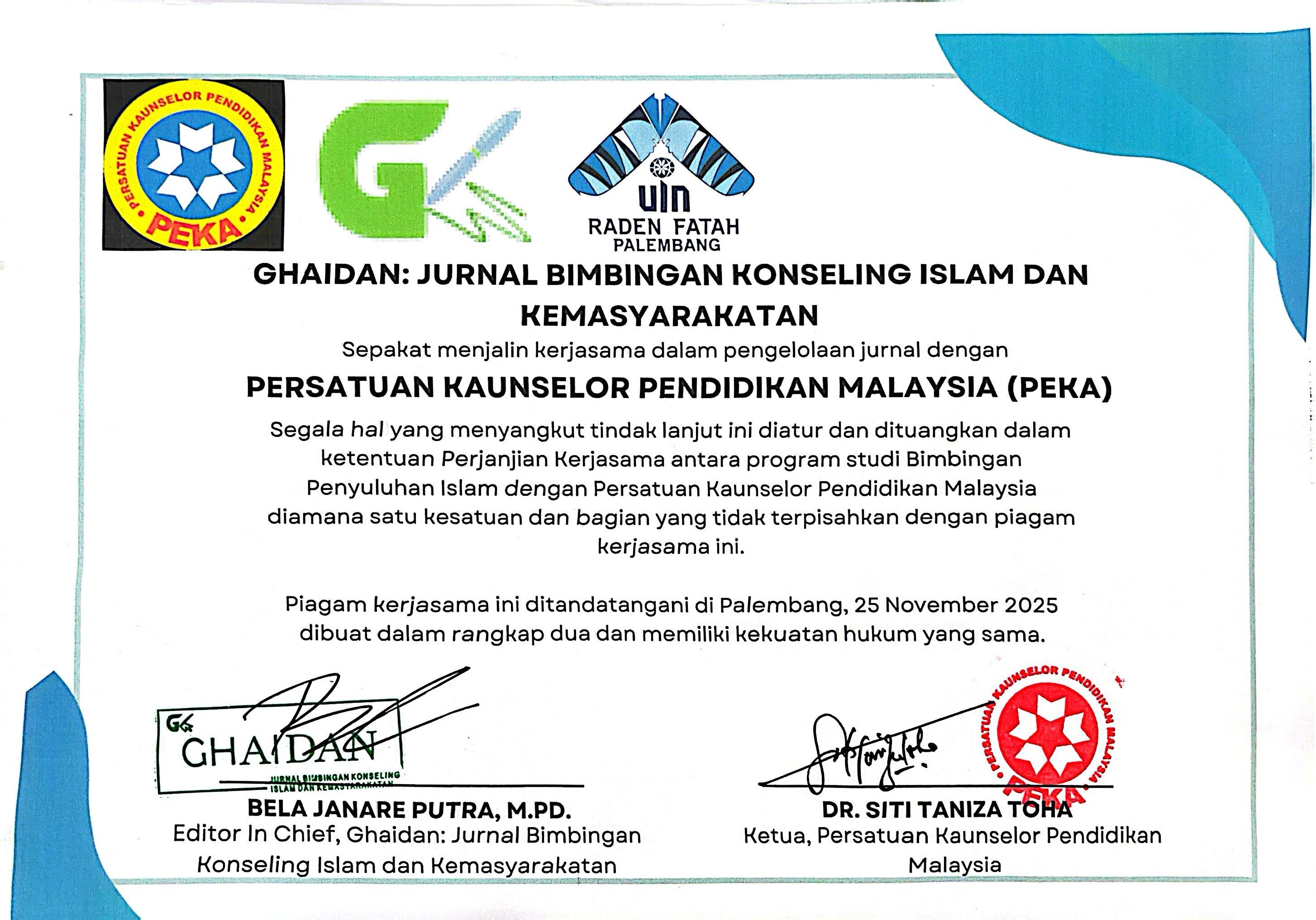Integrasi Tasawuf dan Psikoterapi Islam: Tinjauan Literatur tentang Pengaruh Spiritualitas dan Kesehatan Mental
DOI:
https://doi.org/10.19109/smxnp693Abstract
In this complex era, psychological and emotional challenges are increasing. Psychotherapy has become a commonly used way to help individuals overcome these problems, but in a society that leans more toward a secular outlook, the spiritual aspect is often overlooked. So it is necessary to know the principles of Sufism from an Islamic perspective in the practice of psychotherapy, with the hope of improving the mental well-being of Muslim individuals. This research aims to explore the implementation of an integrative approach between Sufism and psychotherapy in the context of understanding Islamic values in order to improve the mental well-being of Muslim individuals. Apart from that, the aim of this research is to examine the main objectives of Sufism which is based on the Koran and Sunnah. This research applies qualitative methods using a literature study approach and descriptive analysis techniques. Mental and mental disorders are often caused by being too attached to the material world, and the Koran recommends that Muslims always remember Allah to achieve peace of mind. The Koran is an effective way to heal sick souls and mental disorders. Sufism as a form of spiritual medicine in Islam, is seen as a way to overcome mental and mental disorders. Even though Sufism is not included in the official teachings of Ahlu Sunnah Wal Jamaah, it is still considered part of Islam and uses the Al-Quran and As-Sunnah as references in treatment.
References
Abdul W, S, N. (2023). Sejarah Munculnya Tasawuf. Cross-Border, 6(1), 42–51.
Adlini, M. N., Dinda, A. H., Yulinda, S., Chotimah, O., & Merliyana, S. J. (2022). Metode Penelitian Kualitatif Studi Pustaka. Edumaspul: Jurnal Pendidikan, 6(1), 974–980. https://doi.org/10.33487/edumaspul.v6i1.3394
Amaliya, R. N., & Soleh, A. K. (2024). Komparasi Konsep “Terapi Jiwa” Ibnu Qayyim Al Jauzyyah Dan Karen Horney. An-Natiq Jurnal Kajian Islam Interdisipliner, 4(1), 1–12.
Arroisi, J., Mukharom, R. A., & Amin, M. ‘Izzatul. (2021). Sufistic Phsycoteraphy; Telaah Metode Psikoterapi Ibnu Qayyim al-Jauziyyah. Analisis: Jurnal Studi Keislaman, 21(2), 253–278. https://doi.org/10.24042/ajsk.v21i2.9884
As-Shidqi, M. H. (2022). Peranan Ajaran Tasawuf Sebagai Psikoterapi Dalam Mengatasi Penyakit Hati. Living Islam: Journal of Islamic Discourses, 5(2), 187–206.
Aziz, A., & Saputra, R. (2022). Konsep Tasawuf dalam Perspektif Konseling Islami. Guidance, 19(02), 164–176. https://doi.org/10.34005/guidance.v19i02.2127
Deswita. (2014). Konsepsi Al-Ghazali Tentang Fiqh Dan Tasawuf Oleh: Deswita. 13(1), 84–92.
Farial, F., & Handayani, E. S. (2022). Efektifitas Pendekatan Psikoterapi Al-Quran dalam Meningkatkan Resiliensi Remaja Pasca Pandemi. Bulletin of Counseling and Psychotherapy, 4(2), 349–358. https://doi.org/10.51214/bocp.v4i2.303
Fathuddin, M. H., & Amir, F. R. (2016). Konsep Tazkiyatun Nafs Menurut Ibnu Qoyyim Al Jauziyah Dalam Kitab Madarijus Shalikin Serta Implikasinya Terhadap Pendidikan. Ta’dibi, 5(2), 117–127.
Ghozali, M. S. I. (2019). Sabar Sebagai Terapi Penyakit Hati Menurut Al-Ghazali. Ejournal Universitas Darussalam Gontor.
Hakim, L. (2023). Praktik tasawuf akhlaqi di dayah tuhfatul baidha al-aziziyah (mahfad atjeh). Universitas Islam Negeri Ar-Raniry Banda Aceh.
Ibrahim, M., Usman, A. H., & Shahabudin, M. F. R. (2022). Psikoterapi al-Ghazālī: Kajian Terhadap Maqāmāt dalam Kitab Iḥyā’ ‘Ulūm al-Dīn. Islamiyyat, 44(IK), 85–95. https://doi.org/10.17576/islamiyyat-2022-44ik-9
Mashar, A. (2015). TASAWUF : Sejarah, Madzhab, dan Inti Ajarannya. Al-A’raf : Jurnal Pemikiran Islam Dan Filsafat, 12(1), 97. https://doi.org/10.22515/ajpif.v12i1.1186
Misbachul Munir. (2019). Konsep Sabar Menurut Al-Ghazali Dalam Kitab Ihya Ulum Al-Din. Jurnal Ilmiah Spiritualis, 5(2).
Mukhlis, I., & Syahrul Munir, M. (2023). Konsep Tasawuf dan Psikoterapi dalam Islam. Spiritualita, 7(1), 62–74. https://doi.org/10.30762/spiritualita.v7i1.1017
Musa, N., & Sa‘ari, C. Z. (2019). Pendekatan Psikoterapi Islam dalam Menguruskan Tekanan Pesakit Kronik. Journal of Usuluddin, 47(1), 1–34. https://doi.org/10.22452/usuluddin.vol47no1.1
Putri, D. (2023). Korelasi Nilai-nilai Tasawuf dengan Permasalahan Mental di Era Modern. Gunung Djati Conference Series, 19, 379–389.
Putri, R. A. (2022). Mengatasi Rasa Kecemburuan Dengan Psikoterapi Dalam Kajian Tasawuf Di Era Globalisasi. Iktisyaf: Jurnal Ilmu Dakwah Dan Tasawuf, 4(2), 35–52.
Rahayu, E. S. (2019). Bertasawuf Di Era Modern: Tasawuf Sebagai Psikoterapi. Jurnal Emanasi, Jurnal Ilmu Keislaman Dan Sosial, 2(2), 1–9.
Rahman, A., & Ma’sum, M. A. (2022). Psikoterapi Islam Shalat Tahajjud Dalam Meningkatkan Kesehatan Mental Santri. Jurnal At-Taujih, 2(1), 71–85. https://doi.org/10.30739/jbkid.v2i1.1477
Riko Purwanto. (2023). Perbandingan Konsep Tazkiyatun Nafs Antara Ibnu Taimiyah dan Said Hawwa dan Relefansinya dengan Pendidikan Karakter. Bandung Conference Series: Islamic Education, 2(3), 631–635.
Rochman, K. L. (1970). Terapi Penyakit Hati Menurut Ibn Taimiyah Dalam Perspektif Bimbingan Konseling Islam. KOMUNIKA: Jurnal Dakwah Dan Komunikasi, 3(2), 195–221. https://doi.org/10.24090/komunika.v3i2.123
Rosidi, A. (2019). Pendekatan Psikologi Dalam Studi Islam. Jurnal Inspirasi, 3(1), 45–54.
Setiawan, C., Solihin, M., Maulani, M., & Wasik, A. (2022). Aktualisasi Tasawuf Psikoterapi dalam Menangkal Radikalisme Agama. Intizar, 28(2), 94–101. https://doi.org/10.19109/intizar.v28i2.14293
Supriyadi, S. (2016). Community of Practitioners: Solusi Alternatif Berbagi Pengetahuan antar Pustakawan. Lentera Pustaka, 2(2), 83–93. https://doi.org/10.14710/lenpust.v2i2.13476
Taufiqurrahman. (2019). Ikhlas Dalam Perspektif Alquran. Eduprof : Islamic Education Journal, 1(2), 94–118. https://doi.org/10.47453/eduprof.v1i2.23
Waslah, W. (2017). Peran Ajaran Tasawuf Sebagai Psikoterapi Mengatasi Konflik Batin. At-Turats, 11(2), 153. https://doi.org/10.24260/at-turats.v11i2.893
Zaini, A. (2016). Pemikiran Tasawuf Imam Al-Ghazali. Esoterik, 2(1), 146–159. https://doi.org/10.21043/esoterik.v2i1.1902
Zein, M., & Rajab, K. (2020). Rekonstruksi Psikoterapi Islam (Hasil Check Similarity).
Downloads
Published
Issue
Section
License
Copyright (c) 2024 Ghaidan: Jurnal Bimbingan Konseling Islam dan Kemasyarakatan

This work is licensed under a Creative Commons Attribution-ShareAlike 4.0 International License.





